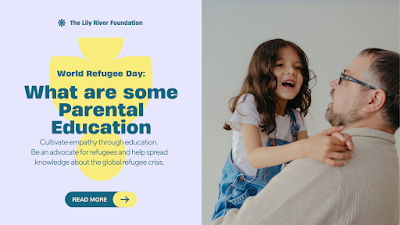Parental Education: Training Parents for Effectiveness in Child Rearing
Parental education refers to the training, equipments and technical support given to parents in bringing up their children. It includes the approaches to a child’s physical development, social and emotional well-being, as well as the thinking abilities. This education makes one prepared to face whatever coming at any stage of parenthood. Here are key areas that can benefit parents:
1. Positive Parenting Techniques
Positive parenting makes you closely connected with your child. This is done, by encouraging, informing and setting behavioral boundaries. Key areas include:
Effective Communication: C1 Parents listen to how the kids feel and then a parent gives some advice as to what should be done. This involves is merely listening, acknowledging their feelings, and facilitating the conduct of such discussions.
Setting Boundaries: Parents learn what types of conduct they should prevent their children from and how they should stop it without using violence and the proper reactions of the child to various forms of punishment. his is helpful in helping the children learn when to stop, and aid in the development of self-discipline.
Parents foster development by paying specific attention to what a child can do and the energy they put into something. Positive reinforcement gives the person the confidence to do and encourages him further. Even admitting failure, the employees should be recognized for hard work done for them to be ready to do the same hard work again in different attempt. Positive direction, not negative reinforcement, is what changes or molds behavior. This approach is good for a child’s growth and development at every age.
It has been found out that understanding the stages of child development can be very useful to parents. It helps them to be able to provide appropriate care and expect reasonable goals. Parental education in this area includes:
Physical Development: Know when and how physical development happens like the toddler’s motor development and the pre-teen’s sexual development.
Emotional Development: Learn about children’s emotional regulation by age and promote their emotional competence.
2: Social Development:
Learn how Social Skills can be developed or enhanced. Aim on sharing, collaboration and coping with pressure from peers. Methods in Removing Behavioral Problems
Effective behavior management is one of the components of parenting education. This holds especially in the management of behavioral concerns. It includes:
Positive Reinforcement: methodology which can be used in fostering desirable behavior or appropriate response through incentives or appreciation.
Natural and Logical Consequences: Employing consequences associated with a child’s behavior, and not extraneous punishments.
Conflict Resolution: Ways in which conflicts and vindictive behaviors can be resolved so that students can learn proper modes of handling conflicts.
3. Health and Nutrition Education refers to formal teachings and learning that concerns how to improve personal and public health through a healthier lifestyle by modifying behavior and practices.
Food and health are some of the most important responsibilities of any parent in upbringing a child. Parental education on this topic covers:
Nutrition Basics: Knowledge about what is good for a child depending on their age with emphasis on the part that has to do with knowledge on what is the right thing to eat.
Physical Activity: Make exercise, play, or particular games and family chores that make it important to promote an active way of life.
Mental Health Awareness: Knowing when your child might be stressed or anxious or have other mental health problems, and how to respond if so.
4. Parent-Child Bonding
Parental support and bonding is the key to all successful relationships in live.” This area of parental education focuses on:
Quality Time: Stressing meaningful child’s time, fun activities and building cherished memories with the child.
Affection and Support: Knowing how touch, verbal reassurance, and reassurance meet the security needs of the children.
Shared Interests: Main focuses of the relations are to identify new activities that are interesting for both subjects and develop the emotional component of parent-child interaction.
5. Schooling and Tutoring
ESL and every child’s education support depends on how the child’s learning style is comprehended and how the encouragement of his learning skills. Parental education in this area includes:
Homework Help: Strategies to help with homework without completing it for your child, helping with homework by fostering learning techniques.
Creating a Learning Environment: Some strategies good for creating the best environment that h will help a child get into a right frame of studying for success.
Encouraging Curiosity: We teach parents the ways on how curiosity can be promoted through playing learning games, going to museum, or enjoying nature.
6. Social and Personal Characteristics
When it comes to education of parents about children’s emotional well-being parents are taught to raise a child’s being strong spirited.
Emotional Regulation: Conveying healthy emotion regulation, for instance teaching children how to use words in calming themselves during stressful situations.
Building Confidence: Suggestions on how to effectively encourage a child with positive feedback and reinforcing wins.
Dealing with Anxiety or Fears: This list contains activities for helping children overcome basic fears or anxiety in a positive way.
7. Discipline Without Punishment
It mattered the real meaning of discipline that was not having to associate it with punishment all the time. Modern parental education emphasizes non-punitive methods:
Time-In Instead of Time-Out: To replace the ‘time out’ method where the child is left alone when frustrated or angry in order to prevent negative behavior, but the staff is allowed to sit with the child if they are angry or frustrated.
Modeling Behavior: Understanding how the actions of parents affects the actions of children & how modeling positive behavior to the children.
Redirecting Behavior: Strategies to redirect or divert an errant child’s behavior focusing him on something more productive.
8. Technology and Digital Safety
The reaction with a topic, therefore, comes with knowledge as children increasingly grow in a digital environment and thus parental education around the technology is of utmost importance. This includes:
Screen Time Management: To say no to particular apps and games, as well as to focus on the rational and reasonable usage of possibilities offered by the Internet and related technologies.
Internet Safety: Explaining to parents about how to control the social networks, use protect options, and talk to their children about safe browsing habits.
Encouraging Healthy Use: Strengthening children and teaching them a proper way to differentiate on a good learning app and creativity other than mere passing time entertainment apps.
9. Parental Self-Care
Selfcare is very relevant in the discipline of parenting. Parental education often includes:
Stress Management: Ways parents can effectively reduce their stress, and display high levels of patience when parenting their children.
Seeking Support: reminding parents that they should go for help; either as parents’ groups, counseling or parents’ workshops where they hear success stories from others.
Balancing Work and Family: Ideas on how to manage work-related stresses and still make quality time for the family say in an exceedingly busy schedule.
Conclusion
Education of parents equips the parents With skills and knowledge to bring up children . The model addresses the importance of matching the professional’s knowledge of individual children, their loyalty to those children, and the appreciation of development stages. This way, parents increase their capabilities, help their child to become stronger, gain confidence and have better outcomes. In view of the fact that every child is different, what is important is an easy going and affectionate attitude.










0 Comments